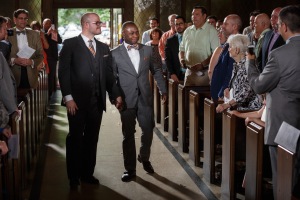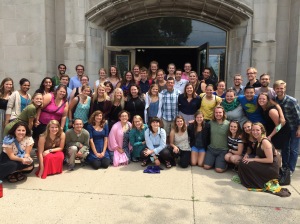Texts: Joshua 24:1-2a,14-18 + Psalm 34:15-22 + Ephesians 6:10-20 + John 6:56-69
 The last time I gave any real thought to what I was wearing was my wedding earlier this summer. Any of you who know me already know that given a choice I will happily slip into a battered pair of jeans and my flip flops and call it a day, but even I had to acknowledge that the occasion called for something more appropriate. So Kerry and I found suits in complementary shades of grey and matching orange plaid ties — mine a neck tie and his a bow tie — and in those clothes we walked down this middle aisle and exchanged our vows.
The last time I gave any real thought to what I was wearing was my wedding earlier this summer. Any of you who know me already know that given a choice I will happily slip into a battered pair of jeans and my flip flops and call it a day, but even I had to acknowledge that the occasion called for something more appropriate. So Kerry and I found suits in complementary shades of grey and matching orange plaid ties — mine a neck tie and his a bow tie — and in those clothes we walked down this middle aisle and exchanged our vows.
These walls have witnessed many vows being made, most often at the baptismal font, and there are traditions around what we might wear to those occasions as well. The precious white baptismal gowns passed from parent to child as each new generation comes to the water; or the crisp white shirt that our brother Ryan wore when he was baptized at the Easter Vigil earlier this year. The white robes we wear in worship (when it’s not so hot) serving as a reminder of the garment we all share in baptism.
When we are baptized promises are made, either by us or over us. If we are children, our parents promise to nurture us in faith and prayer so that we “may learn to trust God, proclaim Christ through word and deed, care for others and the world God made, and work for justice and peace.” (ELW, 228) Our sponsors promise to help us live in the covenant of baptism and in communion with the church. The assembly promises to support us and pray for us. Then, using words that go back thousands of years, we profess our faith in Christ Jesus, reject sin, and confess the faith of the church as the minister asks, “Do you renounce the devil and all the forces that defy God? Do you renounce the powers of this world that rebel against God? Do you renounce the ways of sin that draw you from God?” (ELW, 229) Three questions, three renunciations, as if to undo the three times Peter denied Jesus on the night of his death, and to remind us just how often we are pulled to collude with all the death-dealing powers of this world.
Paul’s letter to the Ephesians sounds an awful lot like the baptismal renunciations as it encourages us to “put on the whole armor of God, so that [we] may be able to stand against the wiles of the devil.” (Eph. 6:11)
For our struggle is not against enemies of blood and flesh, but against the rulers, against the authorities, against the cosmic powers of this present darkness, against the spiritual forces of evil in the heavenly places. (6:12)
That kind of language used to make me squeamish. The supernaturalism of it felt so antiquated in a world of electron microscopes, space shuttles and modern medicine; the world of science and progress in which we live and in which we put our faith.
 Then I opened my email Friday morning to learn that Isaac Acevedo Jr., a 23 year old man on his way home from work, was shot in the chest and killed on his way home from work at Schubert and North Central Park, just a mile directly west of this sanctuary. According to the police Isaac had no criminal background or gang affiliations, not that either of those things would have made his life any less precious or valuable. He worked two jobs to help pay the bills, since his father had recently been diagnosed with a tumor and has been unable to work. He was the oldest of his parents’ children, remembered as a kind and hardworking son. Police suspect his killing may have been a case of mistaken identity.
Then I opened my email Friday morning to learn that Isaac Acevedo Jr., a 23 year old man on his way home from work, was shot in the chest and killed on his way home from work at Schubert and North Central Park, just a mile directly west of this sanctuary. According to the police Isaac had no criminal background or gang affiliations, not that either of those things would have made his life any less precious or valuable. He worked two jobs to help pay the bills, since his father had recently been diagnosed with a tumor and has been unable to work. He was the oldest of his parents’ children, remembered as a kind and hardworking son. Police suspect his killing may have been a case of mistaken identity.
Isaac Acevedo was the 290th person to have been murdered in Chicago this year, and since his death on Thursday morning four more people have been killed in our city. I don’t know why Isaac was killed, but I know that 294 deaths aren’t an accident. I know they have something to do with easy access to guns. I know they have something to do with a culture of pervasive violence against women, both inside and outside of their homes. I know they have something to do with a state-budget held hostage by politicians unwilling to do what is necessary to turn the funding back on so that children have after-school programming as they head back to school this fall, and the gang-violence prevention program in our neighborhood can rehire the CeaseFire interrupters it had to lay off earlier this year. I know it has something to do with the systemic racism that has learned to write off the deaths of black and brown children and adults as acceptable losses. I know it has something to do with a prison-industrial complex that relies on penitentiaries as a source of employment and cheap manufacturing. I know it has something to do with the culture of xenophobia that refers to the children of families fleeing poverty and violence in Central America as “anchor babies,” permits presidential candidates to propose slavery as a response to illegal immigration, and treats that not as a joke but as a serious policy proposal.
I know it has something to do with all of that, but what I don’t have is a single, simple enemy of “flesh and blood” against whom I can direct all my anger and all my despair because I know that even the easy targets, even the relatively obvious violators of the public trust — the gunman, the batterer, the legislator — are also trapped in and products of a system in which comfort, wealth, power and self-interest are constantly being lifted up not only as acceptable ideals, but as the highest value to which we and our children might aspire in our world of science and progress.
Do we think we get to have cheap food, cheap clothes, cheap gas, cheap healthcare, cheap education and cheap taxes? No. Obviously not. So we have created poverty zones within our country and around the world where some must labor for next to nothing so that others can enjoy mass-produced luxuries without wondering where they came from and whose family paid the full price. But no one is willing to pay this price forever. So of course there is violence in our streets and between our nations as human beings, crushed by the faceless apathy and greed of strangers on the north side of the city or the northern hemisphere of the globe, do whatever they can to secure a better life for themselves by any means necessary.
And this system of exploitation is not new, it is terribly, terribly old. We may call it late-stage capitalism, while the apostle Paul calls it “the cosmic powers of this present darkness,” (Eph. 6:12) and Hebrew scripture calls it “the gods that your ancestors served beyond the River and in Egypt,” (Josh. 24:14), but we know what it is. It is the devil. It is Moloch. It is sin. It is greed, layered upon greed, until it begins to look like a way of life instead of a deformation of creation, and it is killing us!
And it is precisely because our greed-drenched way of life is killing us that Jesus calls us to step away from it. Not as a test of faith, not as a work of righteousness, but as a matter of life and death! Jesus, having fed the crowd out of the abundance of God’s fertile creation, from the multiplication of loaves and fishes, declares to hungry people that he is the bread of life. He says, “this is the bread that came down from heaven, not like that which your ancestors ate, and they died. But the one who eats this bread will live forever.” (John 6:58)
But many are offended, and many turned back and stopped following him.
Why are they offended? What has Jesus said that is offensive enough to drive away the very people who the day before were ready to make him their king? Many think it’s the strange nature of his words, “those who eat my flesh and drink my blood abide in me, and I in them.” (John 6:56) No offense, but I don’t buy it. Jesus is clearly speaking poetically, metaphorically. Throughout this long discourse on the bread of life Jesus has been comparing himself to the manna from heaven that God provided to the Israelites on their long journey from slavery to freedom. The bread that could not be stored up, but had to be received by faith, one day at a time. The bread that was distributed equally, without regard to age or gender or rank.
Now Jesus says, “I am that bread. I am the bread of freedom. I am the bread of liberation. I am the sign of God’s abundant life available here and now, received by faith one day at a time, available to you all, equally, without regard to age or gender or rank or nation or religion.” And the crowd is offended, because they know him, because they know his parents, and yet he speaks as if he comes from God, calling them to rely less on the old identities that have defined them, and more on the God of new life calling them into a risky and unknown future.

We have with us this morning two groups of young adults who have heard God’s call to embark on a risky and unknown future, who are preparing to begin a year of service to neighbors both far and near. Later this morning we’ll be commissioning the seven volunteers who will be living very simply in Casa Romero, the LVC house in Humboldt Park, and working in a variety of settings across the city with organizations that promote the common good. We also have a good number of the ELCA’s new cohort of Young Adults in Global Mission, who are in Chicago for a week of orientation before being sent out to accompany sisters and brothers in settings all around the world who have so much to teach us about what it means that “we, though many, are one bread and one body; for we all partake of that one bread.” (1 Cor. 10:17)
As you embark on these life-changing years, but perhaps even more so when you finish them and return home to the places from which you come, it will be hard for people to hear the stories you feel obligated to tell. “Who is this idealistic young adult, trying to teach me something about how the world really works? I knew him when he was in grade school! I changed her diapers! And here she is, speaking as though she comes from God, challenging everything I thought I knew about what it means to be a good, charitable Christian!” At least, I hope that’s what you hear, though in order for that to happen you will have to be as committed to accompanying our aching, fragile church as you are to accompanying the communities of faith and practice which are about to become your new homes.
And we, who are the community of St. Luke’s, are also embarking on a risky and unknown future, not only because we are preparing to leave the building we have called home for over a century, but also because we are living at this moment in a time — a moment in which all the old certainties about what it means to be Christian, what it means to be American, what it means to live in our various skins and ethnic identities, what it means to be gendered, what it means to be married, what it means to be family; a moment in which all the old certainties are changing. And we want so badly to cling to the past, to the old certainties. Even the radicals and the revolutionaries among us know that there are pay offs we’ve silently taken that will have to be relinquished if we are going to follow Jesus into a future beyond empire, into a commonwealth without kings, into a body in which we are all precious and beloved, and none of us is expendable.
Some of the disciples heard the rumblings of change behind the words Jesus spoke, and they left saying, “this teaching is difficult, who can accept it?” And, to be honest, even Peter would still go on to betray Jesus three times at the hour of his death. But God remains faithful to God’s promises, even when we fall short, and does not abandon us even when we turn our backs on God. So I have to believe that as Jesus watched the many disciples turn and walk away his heart remained as full of compassion for them as it does for us, who also cling to what we have known, even in the face of God’s irresistible revolution.
This is why we gather each week to sing the songs, and read the scriptures, and eat the bread of life, over and over and over again. Because we know that we are starving for a world set right, and we know that we follow a God that defines us not by our failures but by God’s grace, a grace that liberates us from every reduction of our humanity and demands that we do the same for every sister and every brother, not out of obligation but out of gratitude. We are blessed to be called children of God because that is what we are, all of us, which makes us one family, one body, one bread, one love. Which is why we cry out with our brother Peter, “Alleluia! Lord, to whom shall we go? You have the words of eternal life.”
Amen.